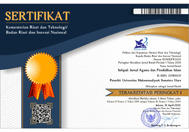Islam Negeri Selangor Tahun 2003 Mengenai Pendaftaran Poligami di Mahkamah Rendah Syariah Hulu Langat Selangor (Studi Kasus Mahkamah Rendah Syariah Negeri Selangor, Malaysia)
Abstract
Keywords
Full Text:
PDFReferences
Abdurramab. (1992). Kompilasi Hukum Islam di Indonesia. Jakarta: Akademik Pressindo.
Ahmad, Muhammad Ali Al Nadwi (2000). Al Qawaid Al Fiqhiyyah, Damsyiq: Dar al-Qalam.
Amin, Suma Muhammad. (2008) Undang Undang Perdata Islam dan Peraturan Pelaksanaan Lainnya di Negara Hukum Indonesia. Jakarta: Rajawali Pers,.
Dimyati, Khudzaifah dan Kelik Wardiyono. (2004). Metode Penelitian dan Penulisan Hukum. Surakarta: Fakultas Hukum UMS.
Doi, Abdurrahman I. (1996). Karakteristik Hukum Islam dan Perkawinan. Jakarta: Raja Grafindo Persada
Doi, Abdurrahman I. (1992). Perkawinan dalam Syari?at Islam, Syari?at The Islamic Law, Terj. Basri ba Asghary, Wadi Masturi, Jakarta: Rineka Cipta.
Enakmen Tahun 2003. (2003). Enakmen Undang Undang Keluarga Islam, (Negeri Selangor)
Al Gazali, Muhammad (tt). Fiqh Sirah Menghayati Nilai-nilai RIwayat Hidup Rasullah SAW, terj. Abu Laila dan Muhammad Thorir. Bandung: Al Marifat.
Ghazaly, Abd Rahman. (2003). Fiqh Munakahat. Bogor: Kencana.
al-Habsyi, Muhammad Bagir. (tt). Fiqih Praktis Menurut Al-Qur?an, as-Sunah, dan Pendapat Para Ulama. Bandung: Mizan Media Utama.
Izzat, Abu. (2004). Fiqh Keluarga Islam. Kuala lumpur: cetakan Al-Hidayah.
Rofiq, Ahmad. (2000). Hukum Islam di Indonesia. Jakarta: Raja Grafindo Persada.
Saleh, K. Wantik. (1976) Hukum Perkawinan Indonesia. Jakarta: Ichtiar Baru
Sunarto, Achmad. (2014). Dibalik Sejarah Poligami Rasulullah Surabaya: Terbitan Ampel Surabaya.
Tihami, Sohari Sahran. (2014). Fikih Munakahat. Jakarta: PT. RajaGrafindo Persada.
Undang-Undang (2007) Pokok Perkawinan Nomor 1 tahun 1974. Jakarta: Sinar Grafika.
Warta Kerajaan. (2003) Government Of Selangor Gazette Published by Authority. Selangor.
Al-Yasin, Jaism Muhammad. (2017) Fiqh Wanita, Cet, Jakarta: PT Serambi Semesta Distribusi.
DOI: https://doi.org/10.30596/intiqad.v13i2.8059
Refbacks
- There are currently no refbacks.
Intiqad Jurnal Agama dan Pendidikan Islam is abstracting & indexing in the following databases:
View My StatsEditorial Address:
Faculty of Islamic Religion, Universitas Muhammadiyah Sumatera Utara. Jl. Mukhtar Basri No. 3 Medan 20238 Telp. (061) 6622400 ext. 27 dan 28 Fax. (061) 6625474. e-mail: intiqad@umsu.ac.id

























